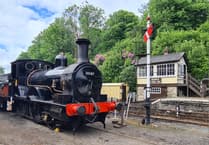Duloe originated in the Bronze Age and has its own stone circle, the smallest of its kind in Cornwall, only 12 metres in diameter.
The eight, eight foot stones which make it up are of a rich quartz rock containing the mineral Ankerite.
The adjoining farm, Stonetown, is named after the circle, and was first recorded in 1329, but the circle was not 'officially' discovered until 1801.
An urn, said to be full of bones, was discovered at the base of the largest stone in 1861.
The Duloe Torque, a gold bracelet from the late Bronze Age was found in a field nearby and now rests in the County Museum in Truro.
The name Duloe has several origins: Dhu-Loo means Black Looe; Du-Loo, Gods river; and Due-Loo, Two Loos, describing the situation of this parish, which lies between the East and West Looe rivers.
The parish of Duloe is scattered, and comprises the village of Duloe and the hamlets of Tredinnick and Hill. It contains several old manors, of which Brodbane, Trenant, Lanwarnick, Killigorick and Tremadart are mentioned in the Doomsday Book, but few traces of the original buildings remain.
The present church St Cuby's, was consecrated in 1321, and it has been suggested that the churchyard was the site of an Iron Age Fort.
Friendly
The vicar is Rev David Burleigh who has been at St Cuby's since 1995 and has introduced several friendly features including a children's worksheet for visitors and a play area called 'Jesus' Playground'.
The church was extended in the 15th century, possibly under the direction of the patrons; the Colshull family of Tremadart Manor.
When the tower was restored in the 1850s because it leaned dangerously, 'whispers' say it was because of the weight of the contraband once stored beneath! The six bells in the tower have rung out over the land since the 1750s and were only silent during the Second World War. A ladies bell ringing team is being formed especially to ring in the new Millennium.
The church houses two fonts, one from the 13th century and the other is a sixth century Celtic font which is probably the oldest in Cornwall and still being used.
The exact age of it is unknown but it was first used as a font in the sixth century. The granite bowl stood for over 1300 years in front of St Cuby's well, the spring water being used for baptisms.
Peaceful
There is a village drinking trough now filled with flowers which was erected by subscriptions in 1902, the coronation year of King Edward vII.
There is also a small methodist Chapel just out of the main village centre.
The Post Office, built in 1840, has been owned by Rod Preston and his wife Gail, originally from Truro and Jersey, for over two years, Rod said: 'Its a peaceful, close community, we are the one major supplier of most things in the village.' Rod still has his cut out of a cow outside his store as a protest against the beef ban which has been there since last year.
Gail, who runs the Post Office said: 'The Post Office is important in the village, we get an awful lot of pensions in here as it's a long way to go to town really.'
For generations Duloe has been a farming community and many of the surrounding farms are owned by the Duchy of Cornwall. However tourism is creeping in, including the modern Duloe Manor, which a complex of holiday cottages and time shares built on the outskirts of the village but there are other, more traditional holiday retreats in the area.
The families of Blackwood and Coley from Reading were found in the stores, stocking up for their week on holiday at Tremadart Farm in Duloe, Mrs Blackwood said: 'Duloe is lovely, we've been a couple of years in a row, it's easy for us to rent out the farmhouse for the 12 of us in the half term. We just really like the Cornish way of life, it's a lot more relaxed.'
Dan and Liz Histed, came from Coventry to Duloe only one month ago, and have moved into a house which used to be the old blacksmith's, which also had petrol pumps outside until a road widening scheme took that feature of the village away and most of the front gardens of those houses as well.
Dan told us that he hopes to meet up with some old army 'pals' and said: 'Duloe's a nice little village and we liked the house even though it needs some work done to it.'
The community is very close, while talking to the Histeds, their neighbour, Mr Ken Rice stopped to help with our enquiries about the history and nature of the village.
Quarry
He said how the stone work of many of houses on the main road were from a nearby quarry and built at the same time as the church.
The Jubilee Centre and adjoining Marquee Club is set just off the road and being a registered charity is managed by the Hall Management Committee where Brian Lewis is the Chairman and Derick Hilton is the President.
The hall started after the Jubilee celebrations in 1977 when an amount of money was left over and the people of the village decided they wanted to use it to build a village hall.
From the initial £100, fundraising continued and the new hall was opened in 1987 by Mrs Gloria Alsy, a member of the Cornish Rural Community Council who helped with the project.
The Jubilee Centre has recently been given a lottery grant with which they are extending the hall and creating a permanent stage for the Duloe Entertainers. They perform a pantomime in December, which this year is being produced by John Potter and is called: 'A tale of 1001 tights'.
The Centre now also has changing rooms and store rooms, a new kitchen and the Women's Institute have helped financially with the creation of a functions room. The centre spent some of the grant on relaying the floor in the main hall and on creating a new toilet block which now has a separate disabled toilet.
The Jubilee Centre hosts a range of events during the week including short mat bowls, skittles, the W I and bingo.
The adjoining Marquee club is rented from the Jubilee Centre, and the two separate facilities work closely together. It has a licensed bar, two pool tables and four pool teams, ladies and mixed darts. The Bar Chairman is Ken Rice and The Chairman is Mrs Marion Rice who also designs and edits the parish magazine - Stone Circle News.
The Chairman of the parish council is Tony Barrett and the County councillor is Mr George Hocking.
The Church of England Junior and infant school's log book dates back to 1884, the head teacher is Mr Howard Balman who has been at the school for about nine years and manages 48 pupils in two classes, the school has close links with the community and takes part in the annual pantomime. They also hold an Under fives group every Thursday morning, alongside this they operate a 'learning together' project which is designed for children that who will be joining the school soon.
The school is also putting on a play called 'Millennium Heroes' and the PTFA are giving special Millennium mugs to all the children.
The garage at the opposite end of the village has been owned and run by K. T. and M. Baker for over 10 years.
The company is a thriving business and owns five large and four medium sized coaches and employs two full time and five part time drivers.
The business is very much family run, with Tim, his wife Sarah and his father and mother, Ken and Rose all pitching in to get everything done and running smoothly. Tim said: 'We keep everything looking good, all our coaches are serviced and regularly smartened up, that's why we're busy.' he joked as we left: 'There's always a good woman behind a successful business!'
The Pub, very much the centre of the village is always busy. At one time it was combined with a butchers shop, very convenient for its patrons to enjoy a fried steak washed down with ale, then the licence was not renewed and it became a temperance hotel, then a private house and has now come full circle and once again the patrons can enjoy a meal and real local ale, namely Sharps from Rock.
Menu
The mine hosts Gary and Alison Toms from Liskeard have owned the pub for five years and have extended it, making the eating area larger. The in-house chef is Colin Bailey, with Pam Spencer and second chef Luke Simpson, they are responsible for the menus and daily specials. One particular feature on their menu is cooking your own steak on hot stones at your table.
They have their own ladies darts team, two pub dogs, Jack and Spotty, who are only let in the pub late at night after the food has finished being served, and a pub cat - Willow, who is regularly found in the warmest spot - by the fire.
An interesting feature of this pub is the numerous amounts of money pinned to the beams in the pub and the various plaques on the walls which carry funny anecdotes, ideal to read whilst drinking and chatting by the bar.
.jpeg?width=209&height=140&crop=209:145,smart&quality=75)


